| Srl | Item |
| 1 |
ID:
058830
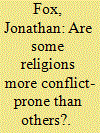

|
|
|
| 2 |
ID:
054326
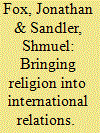

|
|
|
|
|
| Publication |
Hampshire, Palgrave Macmillan, 2004.
|
| Description |
212p.
|
| Series |
Culture and religion in international relations
|
| Standard Number |
140396551X
|
|
|
|
|
|
|
|
|
|
|
|
Copies: C:1/I:0,R:0,Q:0
Circulation
| Accession# | Call# | Current Location | Status | Policy | Location |
| 048773 | 201.727/FOX 048773 | Main | On Shelf | General | |
|
|
|
|
| 3 |
ID:
108934
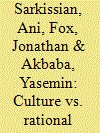

|
|
|
|
|
| Publication |
2011.
|
| Summary/Abstract |
This study focuses on explaining the variation in the treatment of religious minorities in Muslim-majority countries using a novel dataset on religious discrimination-the Religion and State-Minorities (RASM) Dataset. As few theories exist to explain the causes of religious discrimination, this study compares theories related to general religion-state relations based on ideology, culture, and rational choice. We find that while political and structural factors are important in explaining variation in levels of discrimination across Muslim countries, ideational factors may help to explain why certain minority groups appear to be targeted more than others within individual countries. Regional and cultural differences in levels of discrimination exist across the Muslim world, and the identity of the religious minority group matters in determining why some groups face greater repression than others. We argue that knowing the targets of discrimination is important in developing theory about the causes of it.
|
|
|
|
|
|
|
|
|
|
|
|
|
|
|
|
| 4 |
ID:
056721
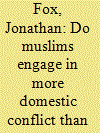

|
|
|
| 5 |
ID:
066058
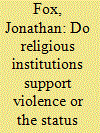

|
|
|
| 6 |
ID:
050902
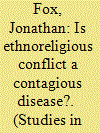

|
|
|
|
|
| Publication |
Mar-Apr 2004.
|
| Summary/Abstract |
The spread of conflict across borders (contagion) is a modern phenomenon of increasing importance. This study focuses on the extent to which cross-border religious ties facilitate contagion of ethnic conflict using data from the Minorities at Risk dataset. The findings show that religious contagion influences the extent of both ethnic protest and rebellion whereas nonreligious contagion influences only ethnic protest. They also show that only violent conflict, as opposed to peaceful mass-political movements, in one state influences conflict in a bordering state. One possible explanation for this is the argument that violence is an intrinsic element of religion. This can explain why religious contagion is stronger than nonreligious contagion and why religious conflicts cross borders only when they are violent ones. This argument is also consistent with previous findings on domestic conflict that show that although religious grievances expressed by an ethnic minority were a contributing factor to the level of rebellion in which that minority engages, they had a negative influence on the extent of peaceful protest.
|
|
|
|
|
|
|
|
|
|
|
|
|
|
|
|
| 7 |
ID:
184195
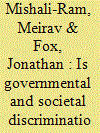

|
|
|
|
|
| Summary/Abstract |
This study asks whether governmental and societal discrimination against Muslim minorities explains the outflow of foreign fighters from non-Muslim-majority countries to Syria and Iraq. We use data from the ICSR, Soufan Group, Pokalova (2018), and RASM datasets to examine the connection between discrimination directed at Muslim minorities and the number of foreign fighters originating in a country. We apply grievance-based theory to examine whether minority-specific objective discrimination is behind the phenomenon. We find little evidence that discrimination increases the outflow of foreign fighters, but this outflow is higher from wealthier countries. The findings indicate that if grievances are a motivation for individuals to become foreign fighters, they are not connected to objective discrimination. This implies that at least some of the grievances relate to personal circumstances or that immigrant minorities are more likely to perceive inequality in wealthier countries.
|
|
|
|
|
|
|
|
|
|
|
|
|
|
|
|
| 8 |
ID:
067166
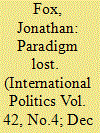

|
|
|
| 9 |
ID:
062092
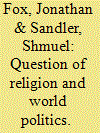

|
|
|
|
|
| Publication |
Spring/Summer 2005.
|
| Description |
p293-303
|
|
|
|
|
|
|
|
|
|
|
|
|
|
|
|
| 10 |
ID:
109197
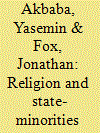

|
|
|
|
|
| Publication |
2011.
|
| Summary/Abstract |
This article presents the Religion and State-Minorities (RASM) dataset addressing its design, collection, and utility. RASM codes religious discrimination by governments against all 566 minorities in 175 countries which make a minimum population cutoff. It includes 24 specific types of religious discrimination coded yearly from 1990 to 2002. Religious discrimination measures the absence of the human right of religious freedom which includes limits on religious practices such as worship as well as limits on religious institutions such as churches and mosques which are not placed on the majority group. Thus the dataset focuses on the restriction of religious group rights. Most similar datasets, including those that focus on human rights in general, include a single discrimination score for a country. RASM is the first to contain an accounting of religious discrimination against all relevant religious minorities on an individual basis while avoiding some methodological problems of previous similar data collections. In order to demonstrate the utility of the dataset, we examine the relationship between religious identity and religious discrimination. We find that both majority and minority identities matter in predicting the treatment of religious minorities. This demonstration that codings for individual minorities add to our understanding of the correlates of religious discrimination is illustrative of the potential uses of this dataset. It also indicates that this type of data can be useful in other types of studies where dyads based on religious identity are relevant, such as studies of ethnic conflict and civil war.
|
|
|
|
|
|
|
|
|
|
|
|
|
|
|
|
| 11 |
ID:
126012
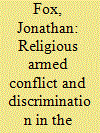

|
|
|
|
|
| Publication |
2013.
|
| Summary/Abstract |
The role of religion in armed conflict and discrimination in the Middle East and North Africa (MENA) is receiving increased attention as the focus of the region's conflicts shifts from nationalism and ethnicity to religion. All of the contributions to this section seek to build knowledge and theories to understand how religion contributes to conflict and discrimination, focusing on the MENA, the world region where religious conflict and discrimination are most prominent. The three articles in this special section of Civil Wars address these changes, each looking at them from a unique perspective including both comparative and quantitative methodology.
|
|
|
|
|
|
|
|
|
|
|
|
|
|
|
|
| 12 |
ID:
079985
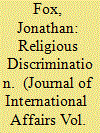

|
|
|
| 13 |
ID:
126017
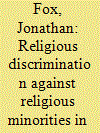

|
|
|
|
|
| Publication |
2013.
|
| Summary/Abstract |
This study examines religious discrimination between 1990 and 2008 against 47 religious minorities in 17 Middle Eastern Muslim majority states using data from the Religion and State-Minorities data-set. The study uses a 29-category variable which measures restrictions on the religious practices or institutions of minority religions which are not placed on the majority religion. Forty-five of the 47 minorities, including all non-Muslim minorities, experience religious discrimination. Discrimination is lowest but still substantial against Muslim minorities (e.g. Shi'i Muslims in a Sunni Muslim state), higher against Christians, but highest against Hindus, Buddhists, Druze, and Bahai. Twenty-eight of the 29 types of religious discrimination included in the data-set are present in the region. Finally, when discounting the removal of Saddam Hussein's regime from Iraq, religious discrimination in the region remains stable.
|
|
|
|
|
|
|
|
|
|
|
|
|
|
|
|
| 14 |
ID:
113524
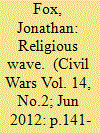

|
|
|
|
|
| Publication |
2012.
|
| Summary/Abstract |
This study examines how well five theories explain the extent of religious domestic conflict using data from 1960 to 2009 from the Political Instability Taskforce dataset. The results show that secularization theory's prediction of a decline in conflict and Samuel Huntington's predictions of a post-Cold War rise in religious identity conflict are inconsistent with actual conflict patterns. Predictions that religious conflicts will remain present are confirmed but this type of theory does not account for changes over time. David Rapoport's wave theory and Mark Juergensmeyer's religious resurgence theory provide the best explanation for a rise in religious conflict as a proportion of all domestic conflict that began in 1977. The results also show that Muslims have been increasingly and disproportionally involved in religious conflict, but not in a manner consistent with Huntington's predictions.
|
|
|
|
|
|
|
|
|
|
|
|
|
|
|
|
| 15 |
ID:
080607
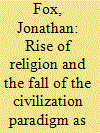

|
|
|
|
|
| Publication |
2007.
|
| Summary/Abstract |
The study presented here compares the impact of Samuel Huntington's concept of civilizations and that of religion on domestic conflict between 1960 and 2004 using the State Failure data set. The results show that examining the religious dimension of domestic conflict provides a better understanding of the dynamics of domestic conflict than does Huntington's concept of civilization. The results show that Huntington's predictions for conflict have not come to fruition as of 2004. Civilizational conflicts are a minority of all conflicts. Muslims, while engaging in a significant amount of inter-civilizational or inter-religious conflict, primarily fight other Muslims. When one takes population size into account, Muslims participate in a disproportionate amount of conflict. In absolute terms, Muslims participated in the majority of all religious conflict for the entire period covered by this study and in 2003 and 2004. Finally, religion increasingly impacts on domestic conflict. Religious conflicts - including religious wars like those in Afghanistan and Algeria, which are not civilizational but clearly between factions within the same religion - are consistently more common than civilizational conflict and became a majority of all conflict starting in 2002. This rise in religious conflict as a proportion of all domestic conflict is not a post-9/11 phenomenon, but is, rather, the result of processes that date back at least to the late 1970s
|
|
|
|
|
|
|
|
|
|
|
|
|
|
|
|
| 16 |
ID:
060817
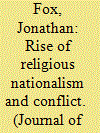

|
|
|
| 17 |
ID:
108685
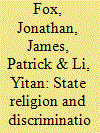

|
|
|
|
|
| Publication |
2009.
|
| Summary/Abstract |
We address two issues neglected in cross-national ethnic conflict literature: the role of state religious exclusivity (SRE) in ethnic conflict and the causes of discrimination against ethnic minorities. We use data from the Minorities at Risk (MAR), Polity, and Religion and State (RAS) datasets to assess whether SRE influences the extent of discrimination and repression against ethnic minorities between 1990 and 2002. The results show that SRE is strongly and significantly associated with discrimination and repression against ethnic minorities. This is true both of ethno-religious minorities and ethnic minorities who are not religiously distinct from the majority group in the state.
|
|
|
|
|
|
|
|
|
|
|
|
|
|
|
|
| 18 |
ID:
020222
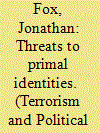

|
|
|
|
|
| Publication |
2001.
|
| Description |
87-102
|
|
|
|
|
|
|
|
|
|
|
|
|
|
|
|